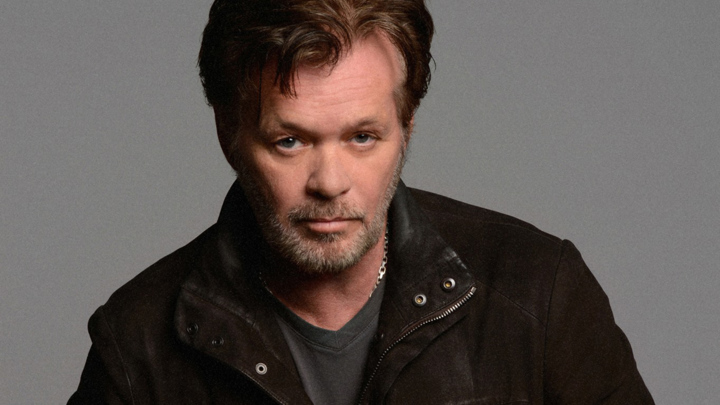 For most of the 24 hours leading up to John “Cougar” Mellencamp’s performance last Tuesday at the Township Auditorium, I made jokes about his name change. You would think that the joke would be stale, given that now-legendary rock and roller dropped the manager-demanded stage moniker in 1991. But, somehow, it still seemed to suggest some critical distance, as if, even if I liked Mellencamp’s songs, I still recognized them as the fluffier, commercially friendly flip side of the alt-country underground that emerged in the late 1980s and early 1990s.
For most of the 24 hours leading up to John “Cougar” Mellencamp’s performance last Tuesday at the Township Auditorium, I made jokes about his name change. You would think that the joke would be stale, given that now-legendary rock and roller dropped the manager-demanded stage moniker in 1991. But, somehow, it still seemed to suggest some critical distance, as if, even if I liked Mellencamp’s songs, I still recognized them as the fluffier, commercially friendly flip side of the alt-country underground that emerged in the late 1980s and early 1990s.
In truth, such a critical distance isn’t really necessary. Yes, Mellencamp had some rather dominant pop hits (“Hurt So Good,” “Cherry Bomb,” and “R.O.CK. in the U.S.A” among them) that felt like water-downed Springsteen, ready to be force-fed to an eager nation in the wake of Born in the USA’s mammoth sales, even if some of them preceded that blockbuster. But, by and large, Mellencamp wrote some of the best straight-forward roots-rockers of all-time, full of elegant small town details and genuine populist fervor, over the course of his career, and he's continued to write and record solid records, with 2014’s Plain Spoken greeted with critical if not commercial acclaim. Yes, he can come off as a poor man’s Springsteen, but really what he does is strip a lot of the excess from The Boss’s approach, writing with a keen sense of detail and little wasted in his spare lyrics. He arranges his songs similarly, balancing acoustic guitar and fiddle against understated electric guitars and organ with little in the way of soloing bombast or orchestral pretension. And I’ll be damned if the chorus to “Jack & Diane” isn’t the most perfect catchy-bleak-honest sentiment of any heartland rocker I’ve ever heard, Bruce be damned.
Plus, the whole Springsteen thing has probably followed him around enough as it is. If anything, generations of Americana singer/songwriters since the 1980s owe more to Mellencamp than he ever owed to his Jersey counterpart. Seriously, listen to folks like Ryan Bingham or Chris Knight and tell me they aren’t just pale imitations when you compare them to the real thing.
So how was the show you ask? Pretty good. Mellencamp opened with a couple of tunes from Plain Spoken as if to prove his songwriting hasn’t lost his step and each was full of his characteristic populist anger and cynical regret. He then proceeded to move smoothly between big hits and deeper cuts, keeping the crowd happy without devolving into pure nostalgia. His solid backing band was as unflashy as his recordings, with only violinist Miriam Sturm truly stepping out and showing off virtuosic chops. And although he was in fine vocal form throughout the evening, punctuating most every song with an energetic yelp or a holler, he seemed mostly bemused, as if he’s a cantankerous-yet-energetic young grandpa who is surprised to find himself surrounded by grandchildren given what a gruff he’s been throughout much of his life. The only time he addressed the crowd directly was to speak vaguely of history and aging, warning that “time is the only critic without an agenda” and delivering a cryptic parable about eating your eggs. It all felt vaguely like a performance Michael Keaton might riff on, Birdman-style, in the next few years.
While the hits might seem the obvious highlights (the acoustic “Jack & Diane,” replete with a gentle chiding of the karaoke crowd for prematurely jumping to the chorus, was genuinely moving), my favorite moments were on newer introspective ballads like “Longest Days” and “The Isolation of Mister” where Mellencamp’s weathered voice and wizened perspective were perfectly matched with the jaundiced philosophy of his earlier material. The other big surprise was when he went into full on Tom Waits-mode, playing up the cragginess of his voice as he sauntered around on stage with maniacal glee on bluesy romps like “The Full Catastrophe of Life.”
At the end of the day, a few people with me were still a bit bummed about some missed hits, but a set featuring “Small Town,” “Pink Houses,” “Cherry Bomb,” “The Authority Song,” and “Rain on the Scarecrow” can hardly be faulted for not giving the crowd what they wanted. For myself, I was just glad to see a legend who was still vital and creating new music while finding a comfortable way to please his audience and put on a good show. As we’ve too often seen, a 60-something rocker can do far, far worse. –Kyle Petersen
